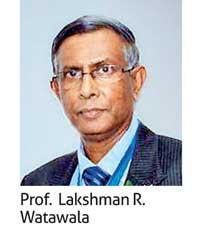25 Sep 2021 - {{hitsCtrl.values.hits}}
School education could be the next thing which could go hybrid in the post-pandemic world, when the governments begin to safely return the children to school after more than one and half years of remote learning necessitated by the pandemic.
 According to Prof. Lakshman R. Watawala, the experiment made during the pandemic in remote leaning in all stages of education proved that there is capacity for Sri Lanka’s school education to go hybrid, provided the educators are adequately retrained on the new digital platforms and are provided them with seamless connectivity.
According to Prof. Lakshman R. Watawala, the experiment made during the pandemic in remote leaning in all stages of education proved that there is capacity for Sri Lanka’s school education to go hybrid, provided the educators are adequately retrained on the new digital platforms and are provided them with seamless connectivity.
“I don’t think that we can really go fully online. The best is to go for hybrid. Because if you go for hybrid, that means certain classes can be done at school and quite a lot of work can be done online,” Prof. Watawala said speaking at an online forum organised by the Institute of Chartered Professional Managers (CPM) of Sri Lanka. The pandemic upended many activities in daily life and among them was education, which shifted online when in-class education became disrupted.
Despite certain issues faced by the recipient children in the rural areas, due to poverty and lack of broadband coverage, remote learning experiment has largely been a success.
And now as the world and Sri Lanka are gradually coming out of the pandemic, due to fast vaccinations taking place, it appears that school education may not want to go back fully into the pre-pandemic set up, instead would keep some of the positive attributes of the online delivery experienced in the recent past.
However, Prof. Watawala, who is also Founder and President of CPM Sri Lanka, stressed the need for the government to make provisions in the budget to incentivise those who contribute the most in facilitating online education.
“In the budget I think they must give incentives for the people who go and put hours in all these areas,” he said addressing the forum, which provided a platform for many sectors to present their proposals for the forthcoming budget.
While online education became a true enabler for seamless adult education, it failed short of becoming a complete substitute for preschool and school education, due to limited interactivity with the teacher, lack of peer association and diversity and the absence of physical activity, which are all integral parts for a well-blended learning for this group for their balanced personality development, which must take place in tandem.
Making another crucial point, Prof. Lakshman also showed the significance of continuous training not just for the teachers and other others in the education sector but also for the entire public servant cadre on the new and emerging digital technology, to both equip themselves with the knowledge to perform in their existing roles and also to enable them to serve the public remotely without having to present in person to obtain and deliver services.
By this way, he said the entire society and the economy would get benefitted in service delivery, quality and cost.
Responding to a question posed at him on the still persistent principal-teacher salary dispute, he proposed to look at the private sector, where the salaries and incentives are tied to one’s performance.
“Normally in the private sector, they will pay the salaries according to performance. So, they will have to look at it in that way and see whether the service that they are rendering to the education sector. And then look at it (salaries and incentives),” Prof. Watawala said.
17 Nov 2024 17 Nov 2024
17 Nov 2024 17 Nov 2024
17 Nov 2024 17 Nov 2024
17 Nov 2024 17 Nov 2024
17 Nov 2024 17 Nov 2024